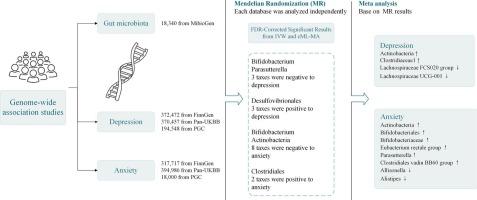肠道菌群与抑郁和焦虑的分析:来自三个数据集的孟德尔随机化
IF 3.7
2区 医学
Q1 PSYCHIATRY
引用次数: 0
摘要
越来越多的证据支持肠道微生物群与精神痛苦,特别是抑郁和焦虑之间的联系,微生物群-肠道-脑轴被认为是潜在的机制。本研究利用大规模全基因组关联研究(GWAS)数据调查了特定肠道微生物群与抑郁和焦虑障碍之间的因果关系。方法采用双样本双向孟德尔随机化(MR)分析方法,通过FinnGen、Pan-UKBB和PGC三个大型GWAS数据库,探讨211个微生物类群对抑郁和焦虑的因果关系。采用敏感性分析验证结果的稳健性。进一步进行随机效应荟萃分析,以提高统计效力。结果MR分析显示双歧杆菌(IVW: OR 0.90, 95% CI 0.83 ~ 0.98)和双歧杆菌科(IVW: OR 0.90, 95% CI 0.83 ~ 0.98)对抑郁症有保护作用。Clostridiales (cML-MA: OR 0.88, 95% CI 0.81 ~ 0.95)和Parasutterella (cML-MA: OR 0.75, 95% CI 0.64 ~ 0.88)与抑郁呈负相关。草藻菌科(cML-MA: OR 1.78, 95% CI 1.24至2.56)、三角洲变形菌科(cML-MA: OR 2.17, 95% CI 1.38至3.40)和Desulfovibrionales (cML-MA: OR 2.22, 95% CI 1.41至3.49)的丰度增加与抑郁症的高风险相关。对于焦虑,放线菌(门:IVW: OR 0.83, 95% CI 0.76 ~ 0.87;分类:IVW: OR 0.84, 95% CI 0.75至0.93),双歧杆菌(IVW: OR 0.80, 95% CI 0.75至0.85),双歧杆菌科(IVW: OR 0.80, 95% CI 0.75至0.85)和双歧杆菌[g] (IVW: OR 0.79, 95% CI 0.74至0.84)。乳酸菌科[f] (cML-MA: OR 1.18, 95% CI 1.08至1.28)、梭状芽孢杆菌[c] (cML-MA: OR 1.15, 95% CI 0.1.06至1.26)和梭状芽孢杆菌[o] (IVW: OR 1.15, 95% CI 1.05至1.27)与焦虑风险增加相关。meta分析结果显示了显著的相关性,特别是放线菌(OR 0.90, 95% CI, 0.83至0.98)和梭菌(OR 0.91, 95% CI, 0.83至0.99)对抑郁和一些分类群对焦虑的保护作用。没有发现抑郁或焦虑对肠道微生物群有显著影响的工具变量。结论我们的研究结果强调了与抑郁和焦虑相关的特定肠道微生物群,强调了这些肠道微生物与精神疾病之间的因果关系。这些结果提示了通过微生物组靶向治疗减轻疾病症状和改善生活质量的潜在策略。进一步的研究,包括随机对照试验和对性别特异性影响的调查,对于验证和扩展这些发现至关重要。本文章由计算机程序翻译,如有差异,请以英文原文为准。

Analysis of gut microbiota and depression and anxiety: Mendelian randomization from three datasets
Background
Emerging evidence supports gut microbiota's association with mental distress, particularly depression and anxiety, the microbiota-gut-brain axis was the believed to be the underlying mechanism. This study investigated the causal relationships between specific gut microbiota and depression and anxiety disorders using large-scale genome-wide association study (GWAS) data.
Methods
A two-sample bidirectional Mendelian randomization (MR) analysis was conducted to explore the causal effects of 211 microbial taxa on depression and anxiety across three large GWAS databases: FinnGen, Pan-UKBB, and PGC. Sensitive analyses were followed to validate the robustness of results. Random-effect meta-analysis was further performed to enhance the statistical power.
Results
The MR analysis revealed that the Bifidobacteriales (IVW: OR 0.90, 95 %CI 0.83 to 0.98) and Bifidobacteriaceae (IVW: OR 0.90, 95 %CI 0.83 to 0.98) had a protective effect against depression. Clostridiales (cML-MA: OR 0.88, 95 %CI 0.81 to 0.95) and Parasutterella (cML-MA: OR 0.75, 95 %CI 0.64 to 0.88) showed negative associations with depression. Increased abundance of Oxalobacteraceae (cML-MA: OR 1.78, 95 %CI 1.24 to 2.56), Deltaproteobacteria (cML-MA: OR 2.17, 95 %CI 1.38 to 3.40), and Desulfovibrionales (cML-MA: OR 2.22, 95 %CI 1.41 to 3.49) was associated with a higher risk of depression. For anxiety, protective effects were found for Actinobacteria (phylum: IVW: OR 0.83, 95 %CI 0.76 to 0.87; class: IVW: OR 0.84, 95 %CI 0.75 to 0.93), Bifidobacteriales (IVW: OR 0.80, 95 %CI 0.75 to 0.85), Bifidobacteriaceae (IVW: OR 0.80, 95 %CI 0.75 to 0.85) and Bifidobacterium [g] (IVW: OR 0.79, 95 %CI 0.74 to 0.84). Lactobacillaceae [f] (cML-MA: OR 1.18, 95 %CI 1.08 to 1.28), Clostridia [c] (cML-MA: OR 1.15, 95 %CI 0.1.06 to 1.26) and Clostridiales [o] (IVW: OR 1.15, 95 %CI 1.05 to 1.27) were associated with increased anxiety risk. Meta-analysis results indicated significant associations, particularly the protective effects of Actinobacteria (OR 0.90, 95 % CI, 0.83 to 0.98) and Clostridiaceae1 (OR 0.91, 95 % CI, 0.83 to 0.99) on depression and several taxa on anxiety. No significant instrumental variables for depression or anxiety on gut microbiota were identified.
Conclusions
Our findings highlight specific gut microbiota that are associated with depression and anxiety, underscoring the causal relationships between these intestinal microbes and psychiatric disorders. These results suggest potential strategies for mitigating disease symptoms and improving quality of life through microbiome-targeted therapies. Further studies, including randomized controlled trials and investigations into sex-specific effects, are essential to validate and expand upon these findings.
求助全文
通过发布文献求助,成功后即可免费获取论文全文。
去求助
来源期刊

General hospital psychiatry
医学-精神病学
CiteScore
9.60
自引率
2.90%
发文量
125
审稿时长
20 days
期刊介绍:
General Hospital Psychiatry explores the many linkages among psychiatry, medicine, and primary care. In emphasizing a biopsychosocial approach to illness and health, the journal provides a forum for professionals with clinical, academic, and research interests in psychiatry''s role in the mainstream of medicine.
 求助内容:
求助内容: 应助结果提醒方式:
应助结果提醒方式:


